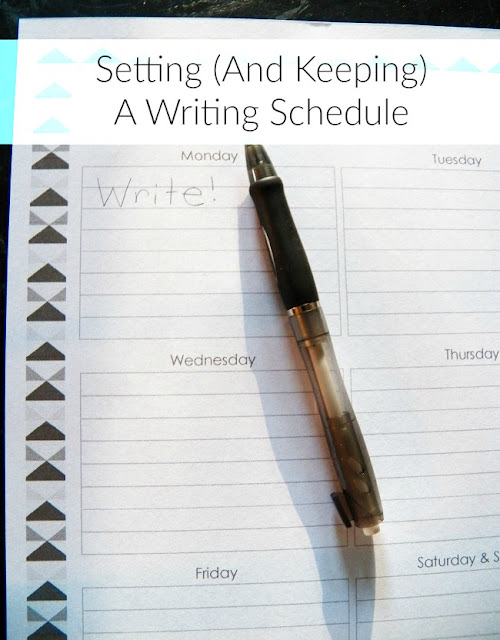Setting (And Keeping) A Writing Schedule
If anyone ever tells you writing is easy, ignore them. Also ignore anyone who tells you to wait for inspiration to write. Dan Poynter said "If you wait for inspiration to write, you're not a writer, you're a waiter." That is true but to write instead of wait, you need to have a writing schedule.
Why You Need A Writing Schedule
You improve at what you practice. Writing is an art, just like drawing or music or sports. It's hard and takes a long time. You wouldn't learn to play the violin, then only practice when you felt inspired to, right? Or if you did, you would never get better. The same goes for writing. A writing schedule helps you keep practicing and learning.
It also has benefits. You complete things fast when you write daily and steadily. It teaches you dedication. And you become a better writer. What's better than that?
Setting A Writing Schedule
A writing schedule is a time and amount you'll write every day. You set these going by various factors. Answer these questions to get started and actually write your answers down.
- When are you most productive? Sunrise? Mid morning? Late night? If you don't know, try some different times and see which works for you. Most people are either a morning writer or a night writer.
- How do you write best? With paper and pencil? On the computer? Using poke berry juice and a sharp stick? Whatever it is, make sure you have all your supplies one place. Try having a nice little kit you grab and go.
- Where do you write best? In your bedroom or at your desk? If you have a dedicated place to write, great. If not, always writing in the same place makes it easier on your brain. It starts to recognize this place as where you work.
- How fast do you want to finish your novel? This will indicate how much you should write a day.
- How much can you write a day? If you want to write 500 words a day but have never written more than 300, you may have to work your way up. Also, how long you can concentrate on writing indicates how long you should work.
Congrats! You've made a writing schedule.
Keeping Your Schedule
Like all things, you'll probably flub up your schedule. But here are some tips to keeping it.
Make goals. Start small, like writing every day for a month (not counting Sundays). When you've done that, try for a bigger one- maybe two or three months. Or if you're feeling really brave, go for a year. You won't want to mess up your goal, and before you know it, writing every day won't be so hard.
There will be days you simply don't feel like writing. I suggest doing something a little different those days. Set aside your current project. Instead, search for a writing prompt on Pinterest or Google. Write for half an hour. And make sure you keep it when you're done. You never know what a gem it may turn out to be.
Reward yourself. Keep a bag of candy and have a piece when you finish your quota. Or save something you really want to do, like read a book, watch a movie, check Facebook, whatever, until you're done. Not only will it feel sweeter, it give you motivation.
Bonus tip- this can work for editing too. Setting a schedule and sticking to it can help you while you edit. Just make sure to have times when you set your work aside to rest.
I hope this helps you with your writing. Even on the hardest days, don't give up. How do you know if you have the next big thing or the next classic if you don't write your story? Follow that dream.




Comments
Post a Comment